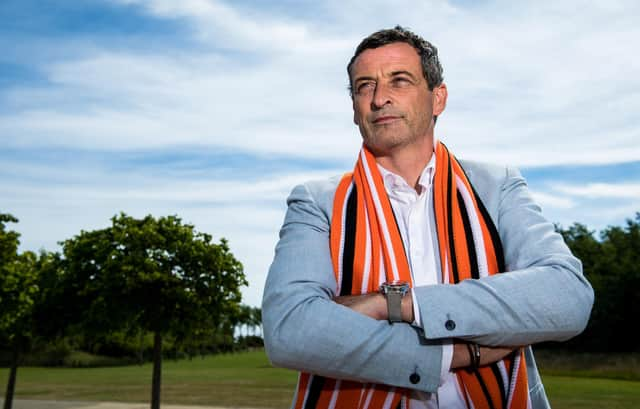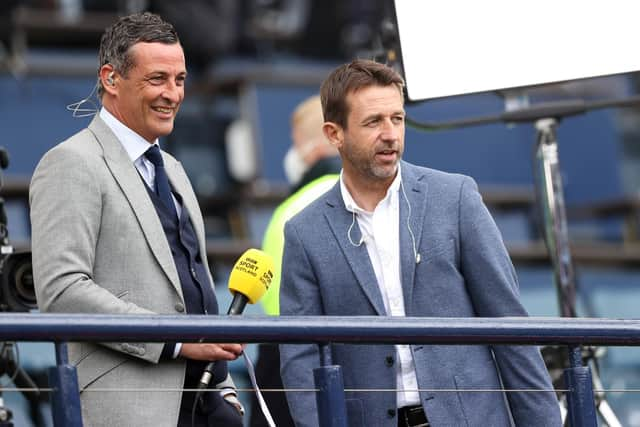Jack Ross: New Dundee United boss' fascinating history with Dundee and why he won't move permanently to Tayside


Jack Ross is the latest incumbent at Tannadice with a Dark Blue past. There have been others, including Ian McCall and Gordon Chisholm. Billy Kirkwood also had a stint at Dens Park before being one of those given the thankless task of succeeding McLean in the mid-1990s. However, Kirkwood’s greatest achievements in a playing sense were while wearing the tangerine shirt of United.
Ross is unusual in that not only was he on the Dundee books in the early 1990s, but he also spent time following the fortunes of the Dens Park club. He even sold programmes outside the stadium.
Advertisement
Hide AdAdvertisement
Hide AdAlthough a proud football city, the rivalry between Dundee’s two senior clubs is not the type that corrodes the soul. Families are often made up of fans of both sides.


An interesting distinction when contemplating Ross’s ties to the city’s football scene is that he is not even a Dundonian. A native of Falkirk, Ross became a Dundee fan by default. One of his friends was from a family of Dark Blues fans and so, while Brockville was only a ten-minute walk away, hitching a lift to Dundee games was relatively straightforward.
He later signed S-form terms for the Dens Park club but the fact he was a fan was just coincidence. He had been spotted by a scout with no knowledge of where the talented teenager was watching his football on a Saturday afternoon.
Ross was there in August 1992 when Dundee beat Rangers 4-3 at Dens Park as a fedora-wearing Simon Stainrod casually leant against a dugout .
It was the best of times, it was the worst of times. He graduated from the youths to full-time. “I am not sure you could get away now with the things that happened then,” the 46-year-old said earlier this week when reflecting on the school-of-hard-knocks environment. He spent his first and last year as a bona fide Dundee FC footballer sharing digs with Neil McCann.
He was released towards the end of the 1993-94 season, the day before an already relegated Dundee side completed their league campaign against Rangers at Ibrox. He had not featured for the first team. Perhaps surprisingly considering he played over 250 times for the likes of Clyde, Falkirk and St Mirren, he never did get to play a competitive game at Dens Park throughout his career.
His release bruised him and damaged his affection for the club. But it wasn’t the end of his association with the city. He continued playing for Lochee United, where he was farmed out while at Dundee, while studying economics at Heriot-Watt University.
“It's bizarre when you think about it now that I would come all the way up on a Saturday to play for a Junior team in Tayside,” he recalled earlier this week. “But it was part of my life and I don't think I'd be where I am without all that education and grounding. It was tough and a good laugh as well.“You think back to that time and what was my ambition, what did I perceive my career would look like playing and then in management? You can't remember, can you? But at the time I enjoyed it. It was part of my grounding and how I'd hope to relate to people across all levels of the game.”
Advertisement
Hide AdAdvertisement
Hide AdRoss is speaking as manager of Dundee United. This long road back to the city where he cut his football teeth might well have involved a coming home of sorts at Dens Park, but he rejected the chance to take over the relegated side last month. Football being football, the crazy paving path delivered him to Tannadice instead. It has required his formative years to be not so much re-imagined as placed in a slightly different context. Rather like that new, supposedly improved United badge revealed last week, some bits have been trimmed.
"I grew up and my first experience of watching football was in the 1980s, so at that time Dundee United were synonymous with success, both domestically and in Europe, Aberdeen were the same at the time as well,” he explained.
“When you grow up in that period, your association is always that it (Dundee United) is a big club. Any city club is big.
"When you work at a city club, it feels different from when you work at some of the provincial ones, just the intensity of it and how much it matters to people in the city or around it.”
Despite his own history in the city, Ross won’t move his family up from Northumberland, where they relocated when he took over at Sunderland. He will stay up during the week. It is the same arrangement he had while with Hibs.
“There's a misconception around what managers do because people forget they are human beings with families and kids in education,” he said. “It's the only industry where you get asked that because where I live there's a lot of people who work in London.
“I'll obviously be based up here most of the time but they (his two daughters) are at important stages of their development and education, plus football management is not exactly the most predictable job to be in …”
He now knows this only too well. He did not grow up a supporter of Hibs, but to be ditched by the club days before a League Cup final appearance against Celtic last season understandably floored him. He wasn’t even able to bring himself to watch the game on television. "I just mucked about with my youngest daughter,” he says. “My eldest daughter and wife were away.”
Torn Achilles tendon apart, which meant he was wearing a protective walker boot when he was unveiled on Wednesday, he’s now ready to go back to work. The past is another country.